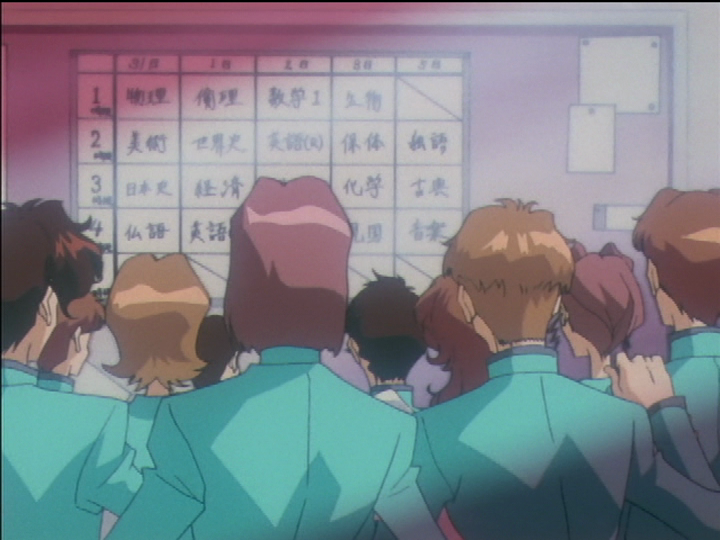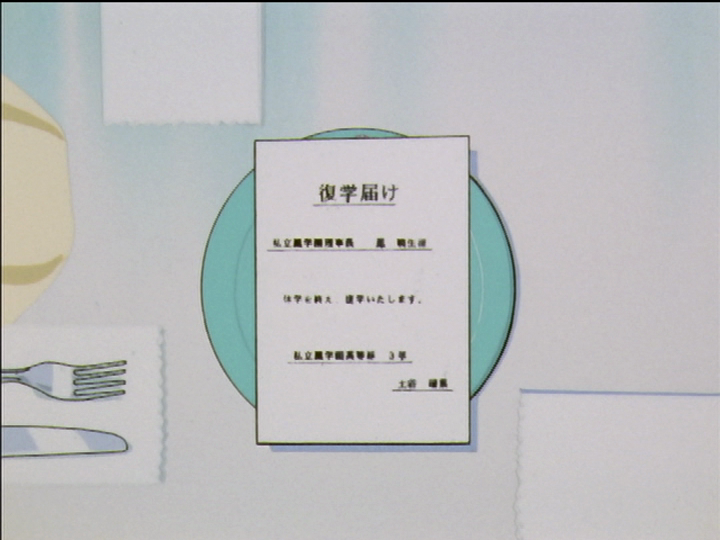I’m interested in translation. I’ve been known to do it myself. So I pay attention to how things are translated.
It is an iron rule that a translation is never good; at best it can be good enough for its purpose. A translation always twists the meaning, and shifts the tone, and alters the emphasis in the original. Nuances, and sometimes essential ideas, may depend on cultural background that can’t be conveyed briefly. Translation is at heart impossible, and people who can do a skilled job of it anyway are to be respected. My issues with the translations should not be taken as disrespectful.
The Nozomi English translation of Utena is professional and aimed at a general audience.
The subtitles sometimes dumb things down. In episode 4, when Miki is kicking off the math study session, the subtitles have him saying “Let’s start with the simple problems.” In Japanese, he says “Let’s start with monomials (tankoushiki).” Those are certainly simple problems. I suppose the theory is that the typical American has heard of monomials but forgot the word before the end of the school term. The simplifying translation bothers me because it flattens the texture of the scene and loses the metaphor of the simple individual versus the complex society. But it was the right way to go with a commercial release for a general American audience.
The subtitles sometimes miss the underlayer of meaning and translate in a way that obscures it. For me, a salient example is Utena’s babble in the First Seduction of episode 33. Some of the lines obscure the metaphors in the babble and erase part of its meaning. Naturally so: To translate the surface meaning and underlying meaning at the same time can be difficult or impossible. And that’s if you know the underlying meaning, which in Utena can also be difficult or impossible!
“The end of the world” is the Nozomi translation of sekai no hate (世界の果て), which can’t be translated precisely. The time the world ends is not what it suggests, so in a way the translation is misleading. In the movie Penguin Highway the same phrase is translated as “the edge of the world.” You might try something more abstract like “the limits of the world”. The manga of Utena translates it as “world’s end”, which is good because it suggests “land’s end” which is the right kind of meaning. Since there’s no precise translation, and since Utena associates sekai no hate with the apocalypse, I think “the end of the world” is fine.
Empty Movement hosts a fan translation of Utena’s scripts, credited to “Yasuyuki Sato/Project Utena Encyclopedia”. It has different goals than the Nozomi translation. It is usually more literal, and pays less attention to smooth flow and natural English. For example, it translates sekai no hate as “Ends of the World” which is technically closer to the true meaning and is unnatural in English (while its original is perfectly natural in Japanese). That’s the tradeoff it chooses.
I doubt it is the latest thing in fan translations. It comes with Japanese transcripts of three episodes. The transcript for episode 1 is dated 2011 May 25, and the first word of the first line has a typo. It reads いそぎ良く格好良く isogiyoku kakkou yoku, when it should be 潔く格好良く isagiyoku kakkou yoku. The typo destroys the meaning completely. The translation itself is OK at that point and must not have been made from this transcript.

The heading of the worksheet translates as “properties of inequalities”. In the red box it lists basics, like if a > b, then a + c > b + c. It does not explain anything, it just lists facts. The flowchart seems to me more confusing than helpful, because (as Utena mentions early in the episode) the problems are easy if you think logically. But maybe the flowchart is useful for those who feel baffled at first. The rest of the worksheet is increasingly complex problems to solve by filling in > or <, drawing on number lines, and so on.
Social inequality is a theme of Utena. The worksheet is a metaphor for recognizing power structures in increasingly complex forms. Akio does not explain anything, but offers what he considers to be facts, and you have to learn for yourself how to fit into the power structures.

The sunlit direction arrows point left to the school office (the partially visible character is 課) and right to the cafeteria. Dios is the sun and approves of these honest services. The shadowed direction arrows point left to the elementary school division and right to the middle school division. Dark Akio put them in the shade for his underhanded control over the students.
The high school division does not get an arrow. Maybe you can’t get there from here.

This is what Utena, body-swapped as Anthy, wrote in Saionji’s exchange diary. The word is iroboke. The Nozomi DVD subtitles translate it as “dumb ass”, which conveys the tone but not the meaning. The bluray subtitles translate it as “perverted idiot” which better captures the meaning but loses the tone. It literally means something like “love fool” and applies to somebody who is so lost in love, or maybe so obsessed with sex, that they hardly think of anything else. The different translations are not bad. Subtitles have to be short, and I don’t know an English word or short phrase that conveys the tone and meaning.
I take it to be a preview of Utena’s feelings throughout episodes 36 and 37, after the Second Seduction. At the end of episode 37, as she walks toward the dueling forest, she calls herself a fool. She uses a different word, but we know she is being a fool for love of Anthy—and that, not long before, she was a bigger fool for love of Akio. It calls back to Wakaba’s letter in episode 1.

I translate the end-of-term final exam schedule of episode 15. It’s fuzzy, but it can be deciphered. The numbers across the top are days of the month. Day 4 is skipped; it is presumably Sunday. The numbers down the left side are school periods. The (1) of “English (1)” is not visible but can be inferred. There is another row to the chart, but in the parts of it we can see, no exams are scheduled.
| 31 | 1 | 2 | 3 | 5 | |
| 1 | physics | ethics | math 1 | biology | - |
| 2 | art | world history | English (2) | health | German |
| 3 | Japanese history | economics | (out of view) | chemistry | classical Japanese |
| 4 | French | English (1) | (out of view) | modern Japanese | music |
Wakaba points out that math and English are on the same day.
The Ethics exam is prominent. Ethics and Health are two subjects that neither Akio, nor apparently the Academy, believes in. The top left exam is physics, which Utena routinely violates. French and German languages make appearances in Utena, and so does classical Japanese.
In episode 25, after checking out the gondola to the dueling arena, Miki reports to the student council that he believes it is to “carry us to a new stage.” The subtitle translation is literal. But in English it is ambiguous: It could mean a theater stage, or it could mean a new stage of the dueling game. It’s both, and we can’t tell from the English. In Japanese it is unambiguous, and specifically means a theater stage. The dueling arena is a stage. Miki’s insight suggests that this is when the dueling tower and Akio’s tower become the same place, as we see in the final showdown. The gondola is the elevator to Akio’s tower residence. If so, then until that point they were different places.
In episode 28, Juri, Miki, and Nanami are on the Student Council platform when Ruka arrives. Miki and Nanami are eating at a table. We see a sequence of documents, presented on blue-green plates of illusion as if they were food. Nozomi does not translate them, so I thought I’d better fill in.

“Notice of Return to School,” an official notice that Ruka is back. It appears; we don’t see it delivered.

A sealed letter from End of the World, delivered by Ruka. It’s on a second plate, and the previous document has disappeared: The documents are metaphorical, not real.

A packet of medicine, with instructions, delivered by Ruka. The header says naifukuyaku, medicine for internal use. It’s the pills Ruka has been prescribed for his illness. You eat pills, so in a way they actually are food.
The sequence associates food with official information that is in some way illusionary, either false or misleading. It is served up, and you are to consume it. Utena personally associates food with sex. In Utena, sex and lies are closely related. The culture in general associates the mouth with sex (not only via kissing), and the mouth is a primary means of transmitting information. Nanami has trouble with her meal when she hears the information about Ruka—she doesn’t like the information.
Ruka’s illness is likely due to Anthy’s poison, which we know can be taken with food. That could be one way the documents are misleading.
Jay Scott <jay@satirist.org>
first posted 19 January 2022
updated 28 May 2025